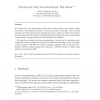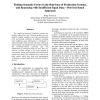118
Voted
JETAI
2007
15 years 2 months ago
2007
Reasoning, problem solving, indeed the general process of acquiring knowledge, is not an isolated, homogenous affair involving a one agent using a single form of representation, b...
154
click to vote
JAPLL
2007
15 years 2 months ago
2007
We extend answer set programming (ASP) with, possibly infinite, open domains. Since this leads to undecidable reasoning, we restrict the syntax of programs, while carefully guard...
130
click to vote
AIL
2005
15 years 2 months ago
2005
In this paper we apply a general account of practical reasoning to arguing about legal cases. In particular, we provide a reconstruction of the reasoning of the majority and dissen...
129
click to vote
ENTCS
2007
15 years 2 months ago
2007
Temporal logics of knowledge are useful for reasoning about situations where the knowledge of an agent or component is important, and where change in this knowledge may occur over...
JOCN
2006
15 years 2 months ago
2006
In an event-related fMRI study, we investigated the neurocognitive processes underlying deductive reasoning. We specifically focused on three temporally separable phases: (1) the ...
105
click to vote
JCIT
2008
15 years 2 months ago
2008
Two simple but practical production systems are modeled using Petri Nets. Petri-net models are very useful in finding semantic errors like generalization error and missing conditi...
133
Voted
JAIR
2008
15 years 2 months ago
2008
Ontologies and automated reasoning are the building blocks of the Semantic Web initiative. Derivation rules can be included in an ontology to define derived concepts based on base...
IGPL
2008
15 years 2 months ago
2008
A critical view of the alleged significance of Belnap four-valued logic for reasoning under inconsistent and incomplete information is provided. The difficulty lies in the confusi...
ARTMED
2006
15 years 2 months ago
2006
The Health Sciences provide a lively niche for case based reasoning applications. The main justification for this is that case based reasoning is a unique methodology in artificial...
122
click to vote
ENTCS
2008
15 years 2 months ago
2008
As an extension to Floyd-Hoare logic, separation logic has been used to facilitate reasoning about imperative programs manipulating shared mutable data structures. Recently, it ha...


